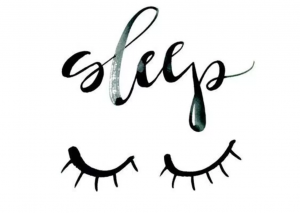You’ve been awake since 8—maybe 6 or 7 if you had an early class, or practice, or were finishing up that assignment at the last minute—barely making it through the day on coffee and willpower. After getting through the readings and problem sets for tomorrow, finally you can nestle into your comforter and drift into sweet unconsciousness… until it’s time to wake up and do it all over again. Is that French quiz tomorrow, or the day after? Why does your phone keep buzzing? Did you remember to put your presentation notecards in your bag? How are you still awake? Before you know it, an hour has slipped by, and you’re still not asleep.
Often, trying to balance school, work, relationships, chores, and hobbies, getting enough sleep becomes one of those things we know we should do, but don’t. In the chaos of college life, it falls to the wayside. But if you won’t listen to your mother, at least listen to what I’ve gleaned from The National Institute of Health, the American Psychological Association, and the Division of Sleep Medicine at Harvard Medical School: sleep is crucial to your physical health, judgment, decision making, memory consolidation and learning, mood, mental health, and emotional well being. The term “sleep hygiene” is defined by the National Sleep Foundation (NSF) as “a variety of different practices and habits that are necessary to have good nighttime sleep quality and full daytime alertness.” Sounds like a good investment, right? Fortunately, better sleep does not have to mean upending your lifestyle or breaking the bank. Here are 6 simple, easy ways to take care of yourself by improving your sleep hygiene:
1. Respect the Circadian Rhythm
Your circadian rhythm is concerned with “physical, mental and behavioral changes that follow a 24-hour cycle, responding primarily to light and darkness,” according to the National Institute of General Medical Sciences. Going to bed and waking up at the same time every day help regulate your internal clock. Another important factor to keep in mind, if you spend long hours in the library like I do, is to get sunlight during the day and keep your room dark at night. See if you can get some of your reading done in the park early in the day.
2. Wind Down
Give yourself some time at the end of the day to de-stress and mentally prepare for bed. Meditate, write in a journal, do breathing exercises or gentle Yin yoga poses. If that’s too hippie-dippie for you, take a soothing shower, write down your to-do’s so you’re not worrying about remembering them once you’re in bed, listen to music, or have a small cup of camomile tea at least an hour before going to sleep. That said, drinking too much of anything close to bedtime will result in a trip to the bathroom, making it hard to fall back asleep. Try to limit your intake at least an hour before getting into bed.
3. No electronics!
Maybe you use the app Flux on your computer, and you turn on “Night Shift” on your smartphone, but these gadgets still disrupt sleep. According to sleep.org, these devices interfere with your circadian rhythm by suppressing melatonin. They keep your brain alert and prevent you from falling sleep, and the notification tones can keep you up too. If you’re like me and use your phone as your alarm clock, try wrapping up your gadget usage at least an hour before bed, put your phone on silent (yes, the alarm will still go off), and leave your phone out of reach, face down so that the light won’t disturb you if you do get a notification.
4. Exercise
I’m not here to tell you to “tone your abs,” “bulk up,” “slim down,” or any related BS. I am here to tell you that regular aerobic exercise— even 20 minutes of cycling or brisk walking—can help you sleep better. A NSF study in the journal Mental Health and Physical Activity showed that “150 minutes of moderate to vigorous activity a week, which is the national guideline, provided a 65 percent improvement in sleep quality.” Why not go for a walk or a jog to get your daily dose of sunshine at the same time?
5. No Caffeine 6 Hours Before Bed
You’ve heard caffeine can affect sleep, but maybe not the full extent of its effects. According to a 2013 study in the Journal of Clinical Sleep Medicine, caffeine consumed even 6 hours before bedtime can have adverse effects on the quality of your sleep. If you’re really attached to your coffee, stick to decaf later in the day.
Use these tips to improve your sleep, your health, and ultimately your happiness. Go forth and slumber!
By Sofia Lerner
Sofia Lerner is a Campus Clipper publishing intern who is studying English as a senior at NYU. Passionate about literature, dance, and wellness, Sofia aspires to help the arts thrive and help others pursue healthy lifestyles. For over 20 years, the Campus Clipper has been offering awesome student discounts in NYC, from the East Side to Greenwich Village. Along with inspiration, the company offers students a special coupon booklet and the Official Student Guide, which encourage them to discover new places in the city and save money on food, clothing and services.
At the Campus Clipper, not only do we help our interns learn new skills, make money, and create wonderful e-books, we give them a platform to teach others. Check our website for more student savings and watch our YouTube video showing off some of New York City’s finest students during the Welcome Week of 2015.















